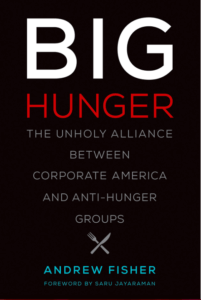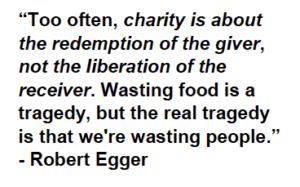January 25, 2018
Recently I attended, “Rooting out Hunger: Strategies and Perspectives in the Anti-Hunger Movement“, held at Colorado College and featuring Andy Fisher, author of the new book Big Hunger.
 Mr. Fisher seemed to present an open-and-shut case. Chronic hunger is a direct result of poverty, and poverty is the result of concentrated power and wealth. Companies like Walmart use unchecked monopoly power to drive down wages, while their employees, as a group, are the largest recipients of SNAP and other government welfare dollars. Mr. Fisher also described what he called a “hunger-industrial complex,” made up of numerous companies and organizations who are thouroughly invested in maintaining rather than eliminating hunger, as doing so is good for business.
Mr. Fisher seemed to present an open-and-shut case. Chronic hunger is a direct result of poverty, and poverty is the result of concentrated power and wealth. Companies like Walmart use unchecked monopoly power to drive down wages, while their employees, as a group, are the largest recipients of SNAP and other government welfare dollars. Mr. Fisher also described what he called a “hunger-industrial complex,” made up of numerous companies and organizations who are thouroughly invested in maintaining rather than eliminating hunger, as doing so is good for business.
His presentation was logical and persuasive. So, what was the community response?
Following his presentation, Mr. Fisher joined a panel of people representing local non-profit charitable organizations, and one for-profit reseller of food waste (Food Maven). Their discussion seemed to me a lost opportunity to look hard at some tough and critical issues.
 One of our city leaders asked the obvious question, “What do we do about hunger?” The obvious answer — “stop feeding the root problem” — didn’t come. No one pointed out that the city of Colorado Springs seems to advantage Wall Street-based businesses over locally owned enterprises. No one asked why the city will build new intersections with stop lights, arrows and double turn lanes into Walmart stores, big box shopping centers, national chain fast food joints and gas stations. Or why so much of our population eats at restaurants that send local dollars out of town everyday on the Sysco truck. Or pointed out how ridiculous is it to hold fundraisers for Care and Share, the regional food bank, at the Broadmoor, which is not only the most expensive venue in town but also a major point of wealth extraction (it has not been locally owned for many years and buys very little locally.) Why is Venetucci Farm, the last working farm within 50 miles of Colorado Springs, being allowed to fail, despite the fact that it was gifted by Bambi Venetucci to the Pikes Peak Community Foundation, no doubt hoping it would remain an asset to the community?
One of our city leaders asked the obvious question, “What do we do about hunger?” The obvious answer — “stop feeding the root problem” — didn’t come. No one pointed out that the city of Colorado Springs seems to advantage Wall Street-based businesses over locally owned enterprises. No one asked why the city will build new intersections with stop lights, arrows and double turn lanes into Walmart stores, big box shopping centers, national chain fast food joints and gas stations. Or why so much of our population eats at restaurants that send local dollars out of town everyday on the Sysco truck. Or pointed out how ridiculous is it to hold fundraisers for Care and Share, the regional food bank, at the Broadmoor, which is not only the most expensive venue in town but also a major point of wealth extraction (it has not been locally owned for many years and buys very little locally.) Why is Venetucci Farm, the last working farm within 50 miles of Colorado Springs, being allowed to fail, despite the fact that it was gifted by Bambi Venetucci to the Pikes Peak Community Foundation, no doubt hoping it would remain an asset to the community?
Until we address the root problems that cause lack of opportunity for workers and business owners and a lack of self-reliance for our community, hunger will continue to be one of the few growth industries in our region and around the country.
Mike Callicrate
Ranch Foods Direct
Peak to Plains Food Distribution – “Building community around local food!”












